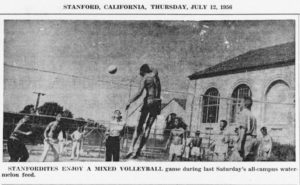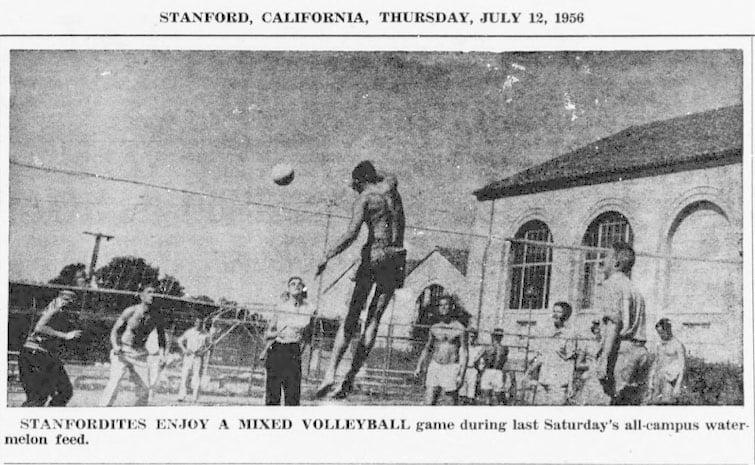The feature “On This Day in Stanford History” details unusual or humorous events that occurred on the same date or week in past years from the Daily archives.
According to The Stanford Daily archives, during the week of July 9-15 on…
July 11, 1919: The first year that the Daily was available in July included a humorous article on simplified spelling. The opinion essay riddled with spelling errors argued for the merits of adding unnecessary silent letters to all words, as “the present word ‘it,’ for instance, could be simplified a great deal…with an ‘ough’ at the end.”
July 12, 1923: In an article called “Stanford Ghosts Abroad on Quad,” a staffer revealed the truth about the mysterious creatures floating around campus. Once-thought ghosts roaming the quad turned out to simply be people shooting film in the shady arcades.
July 9, 1929: According to professor of hygiene and physical education Dr. Harry Torrey, schools needed to talk more about sex, although circumstances were certainly better than the mid-Victorian era, “when it was not regarded as a fit subject for conversation.” To introduce the idea of sex to young children, “instead of telling the child the stork myth, Dr. Torrey would give him pets in whose life he could observe the common phenomena of sexual life unemotionally.”
July 14, 1936: The school received a message from the consul general in San Francisco for Egypt, who was offering $100,000 to any scientist who could control the destructive cotton leaf worm problem in Egypt. In the article titled “Prize Offered for Pest Control,” the counsel general declared that the worm had been “a great curse” and severely damaged the nation’s cotton crop by causing “disfiguring blotches on the cotton leaves.”
July 11, 1940: Campus policeman Gordon Davis, described as “the dark, good-looking cop,” stated in an article that Stanford students “aren’t all that mischievous” and are a “well-behaved lot, even though they like to throw water bags and such.” Instead, he spent most of his time pulling over off-campus folks near the Cubberly Education Library, where The Daily writer commented that “they seem to think that they can park anywhere they please; maybe they haven’t learned to read like Stanford men and women.”
July 9, 1948: Police Chief Gordon Davis ejected from campus members of the Technocracy Organization, who were passing out pamphlets promoting their organization on campus. At the time, the organization proposed “a social design with vast changes including the elimination of money… [and] opposed…democracy, autocracy, liberalism, conservatism, communism, fascism, and socialism.” The organization advertised that “everyone in the United States is eligible for membership except aliens, politicians, and Asiatics.”

July 12, 1956: Chairman of the Stanford Watermelon Feed, a tradition that is no longer upheld, Hall Seely ’58 confirmed that the previous week’s Feed to celebrate the Fourth of July was indeed a success, as “700 pounds of melon had been completely devoured by the Stanford students.”
July 9, 1971: Dr. Leland Smith, acting chairman of the music department, spoke with The Daily about his novel course in computer-generated music, which he “absolutely” considered to be a legitimate form of musical expression. High costs of computers restricted this form of music to universities, but within 10 years, “computer systems should cost about $50,000,” a much more realistic price for an instrument, predicted Smith at the time. However, Smith did not see computer music becoming popular music, as “pop music is 80 percent improvisation and computer music takes a great deal of organizing and planning.”
July 14, 1987: An article titled “Computer music festival shocks Frost Thursday” presented “CCRMA’s annual Computer Music Festival,” words that a staffer joked would surely leave readers with a “puzzled bewilderment, [asking] ‘What the hell does it mean?’” The CCRMA (pronounced “KAR-ma”) occupied the “haunted mansion” behind Florence Moore Hall and was a facility for using the computer as “a new musical and artistic medium, and as a research tool.”
Contact Benjamin Chen at thebenchen10 ‘at’ gmail.com.
